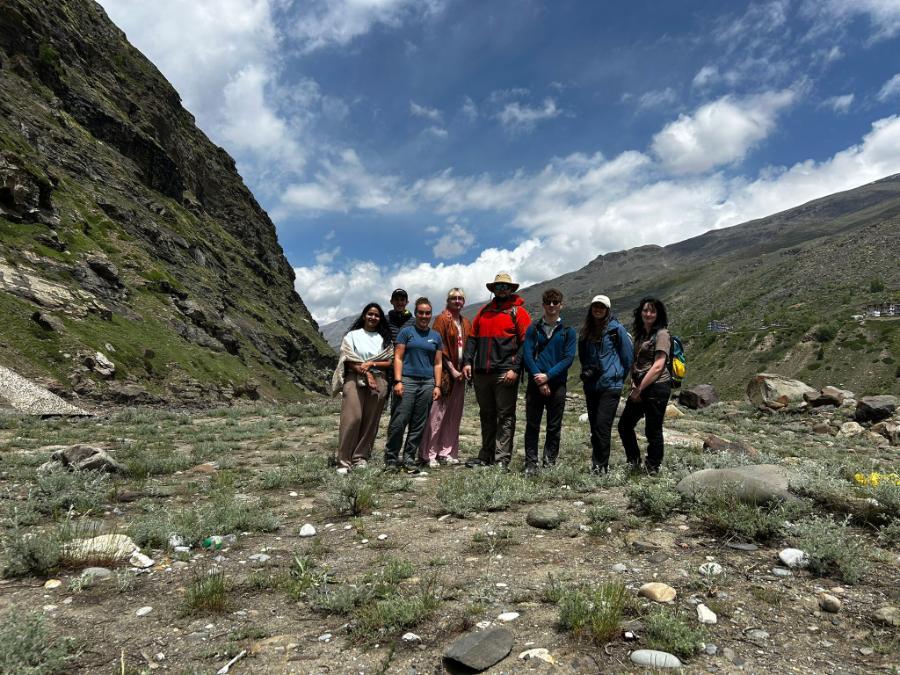.webp)
Gemma Howlett (Head of Teaching, Learning and Student Experience, Institute of Health) shares her commitment and work in ending violence against women.
I want to, if you will indulge me, share a little about my research. But, more importantly, for this blog, I would like to talk about my journey to this research, as I am hoping it will resonate with at least some of you. I feel very passionate about ending violence towards women; I want all women to feel safe in their homes, safe in their places of work or education, and safe everywhere.
Running or walking home should not feel like an anxiety-inducing and frightening experience. But I haven’t always thought like that. Now, that is not to say I have thought that I wanted women to be harmed, but I just did not really think about it at all. I am a gay woman, so since my late teens, I have not had relationships with men. I am more “masculine” presenting in appearance (although this binary view is problematic for many reasons, that is how many in society may describe me), so I have not faced the same harassment as the women I speak to daily.
Violence against women is a problem that we all must help tackle. It is something we all must be the solution to.
It is, in essence, not my problem — I do not have the same issues. But that is a big part of the point. Violence against women is a problem that we all must help tackle. It is something we all must be the solution to. Society will be better if we tackle the roots of misogyny and toxic masculinity; it will be better for all, including men. It cannot be for men to say ‘I would never do anything like that, so it is not my problem’, or for women to say, ‘I have never experienced it, so it is not my problem’. It is all our problem.
My research focusses on sexual harassment of women in the ambulance service. However, a lot of what is seen in the ambulance service is mirrored in society in general. Sexual harassment and sexual violence are part of the overall picture of violence towards women. You may not consider being cat-called in the street as violence, but it is part of a problematic picture. Central to this picture, and a key consideration, is misogyny. Misogyny is at the heart of sexual harassment; you therefore must look at them as part of the same lens.
Using its most simplistic definition, misogyny is a hatred of women. This hatred is displayed and “performed” in a variety of ways. It is the discrimination of women based on their gender; it is the sexual harassment and violence towards women; and the belittling, humiliation, and objectification of women. I acknowledge that women are not the only victims of harassment and sexual violence, but they are in the majority. And as White Ribbon put it, we have to tackle “harmful and dominant masculine norms”.
My research and my ongoing conversations with victims of sexual harassment and misogyny, not only in the ambulance services but across the NHS sector and beyond, highlights worrying trends and behaviours that women are subjected to every day. Equally worrying is the amount of behaviour that, from an outsider’s perspective, could be labelled as sexual harassment that has been normalised and accepted as something that just happens, something that we must just deal with, something that we must accept. This normalisation then has an impact on what is classed or, more importantly, identified as sexual harassment or inappropriate behaviour. Creating a culture where all inappropriate behaviour is challenged and called out is essential.
We must call out harassment and violence whenever we see it: inappropriate jokes and banter; concerning statements we hear our friends make; a woman being “pestered” on a train or bus. We must all be active in our allyship, we must all educate ourselves around this problem. We all need to speak about this problem and acknowledge different experiences from our own. Together, we can make a difference if we all turn up and are all part of the solution.
Learn more
The University of Cumbria became White Ribbon UK accredited in June 2022, joining the global White Ribbon movement to end men's violence against women. You can find out more about our three-year action plan on our dedicated White Ribbon web page.

.jpg)


.jpg)